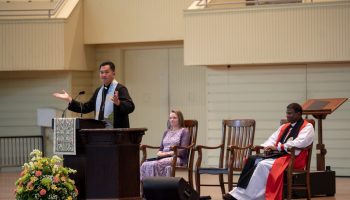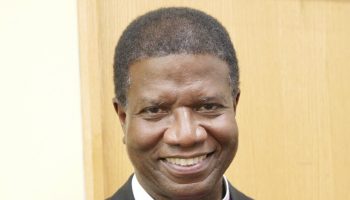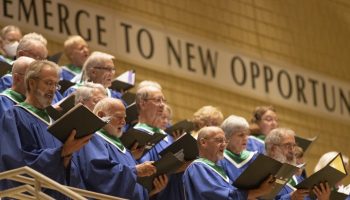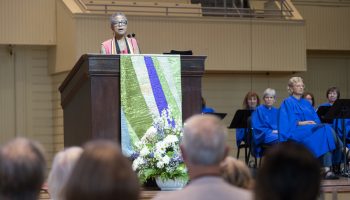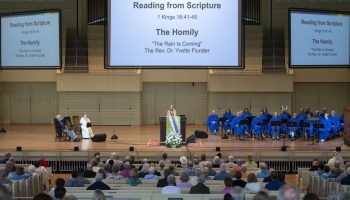“In this precarious time, it is good to go back to basics and claim the deep wisdom of our faith traditions,” said the Rev. Margaret Bullitt-Jonas for the Wednesday, July 1, morning devotional on CHQ Assembly. “Who do we think we are? Each spiritual tradition has its own ways to answer what it means to be a human being.”
Her sermon title was “Faith for the Earth: Who Do We Think We Are?” The scripture text was Matthew 3:13-17 (NRSV) —
“Then Jesus came from Galilee to John at the Jordan, to be baptized by him. John would have prevented him, saying, ‘I need to be baptized by you, and do you come to me?’ But Jesus answered him, ‘Let it be so now; for it is proper for us in this way to fulfill all righteousness.’ Then he consented. And when Jesus had been baptized, just as he came up from the water, suddenly the heavens were opened to him and he saw the Spirit of God descending like a dove and alighting on him. And a voice from heaven said, ‘This is my Son, the Beloved, with whom I am well pleased.’”
Baptism is part of the essential story of the Christian faith, told in all four Gospels. “Jesus’ baptism was a pivotal event because it revealed who he was,” Bullitt-Jonas said. “It revealed the identity that he had since before time began — that he was a child of and the beloved of God.”
For Christians, baptism is a basic ritual no matter how it is done — in a flowing river or sprinkled from a font. “However, what happened to Jesus can happen in our lives,” Bullitt-Jonas told the virtual congregation. “We can be awakened to the life of God in us.”
She asked, “Do you even wonder who you really are deep down? The answer is that you are a son, a daughter, beloved of God.” And God is well pleased.
Bullitt-Jonas said that everyone has doubts at times and makes mistakes, but in the Abrahamic tradition, everyone has a deeper identity.
“In the Abrahamic tradition, we believe that people are created in the image of God, that our eternal selves are always embraced by God,” she said. “Divine life is flowing through us; we belong to God forever and love is our essential nature.”
She urged the congregation to hold on to that truth in this time when so many feel distressed, anxious and depressed, and when everything seems to be falling apart.
“Take a moment to remind yourself of the eternal truth — you are a son, daughter, beloved of God and nothing can separate us from the love of God,” Bullitt-Jonas said. “That love extends to the whole human family; indeed, to the whole creation. It is the message of Genesis, the Psalms, John’s Gospel and the letters of Paul: God’s love is boundless.”
It is not necessary to be a mystic to be amazed by the beauty of the world. Anyone can see the beauty of a single leaf, the majesty of a mountain or the glory of the stars, she said.
“We experience humility, wonder, gratefulness and awe when we meet God in the natural world,” she told the congregation. “We slow down and greet those who are other than our human kin.”
Jesus lived close to the earth, she said, “whether praying on a mountain or walking on water. His words are full of nature — seeds, rocks, vines, sparrows, sunsets. He understood the inherent sacredness of the world, a living, sacred whole. As the psalmist said, ‘The earth is the Lord’s and the fullness thereof.’”
She quoted Gerard Manley Hopkins: “The world is charged with the grandeur of God.”
In the studio where Bullitt-Jonas records her sermons, there is a painting of St. Francis that serves as a backdrop for her series. The painting shows Francis with a wolf, whale, turtle, snake, rabbit, the stars, the sun and the moon. “St. Francis had a simple prayer that he prayed often — ‘Who are you, God, and who am I,’” she said.
Bullitt-Jonas continued, “Francis’ identity did not stop with his skin. He was aware of the give-and-take he had with others. Buddisht philosopher Thich Nhat Hanh calls this ‘interbeing.’”
Baptism, she said, reminds Christians that they are a part of a living, sacred whole. “Indigenous peoples use other ways to remind people that they belong to the land, sea and sky, and the Spirit that created it all.”
Theologian Douglas E. Christie has said that humans need to relinquish the tendency to see ourselves as beyond the world and see ourselves immersed in the world, in its very life.
“We need to tread more gently, more kindly,” Bullitt-Jonas said. “We know other people are truly our siblings, part of our family.”
She asked the congregation: Would we pray, protest, resist and organize against governments and multinational companies that would destroy every means to protect the climate?
“Humans need to journey back to a place where we are more than isolated, individual consumers. We need to connect with God, with others and the earth,” she said. “Our task is to find our way back to union with God and God’s creation. The natural world is sacred, filled with God, and connected to other beings who share the planet with us.”The Rev. George Wirth, a retired Presbyterian minister from Atlanta, presided over the service with a pre-recorded sermon in Chautauqua’s Hall of Christ. Chautauqua’s interim organist, Joshua Stafford, played “Folk Tune,” by Percy Whitlock, as the prelude, and “Paean,” also by Whitlock, as the postlude, on the Tallman Tracker Organ. He also played the hymn tune “Christ, When for Us You Were Baptized.” Before the sermon, Robert A. Jonas played a rendition of “Amazing Grace,” by John Newton, on the shakuhachi. Due to technical difficulties, the sermon that was broadcast was from Tuesday, June 30. The sermon for Wednesday, July 1, is available on demand on CHQ Assembly. Support for this week’s services is provided by the Geraldine M. and Frank E. McElree, Jr., Chaplaincy Fund and the John William Tyrell Endowment for Religion.


